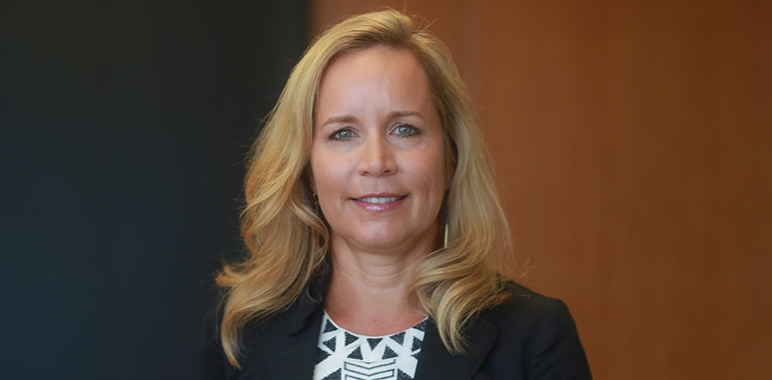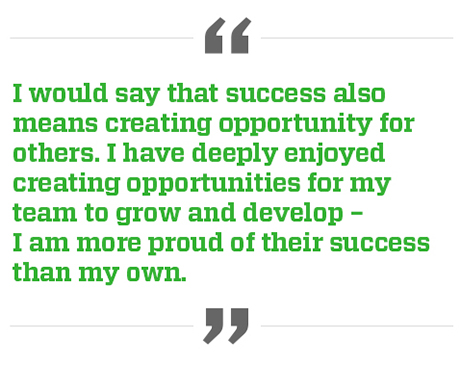Sharlyn Heslam Feature Profile
Letter to My Younger Self: There's No Substitute for Authenticity

Sharlyn (“Shar”) Heslam is Managing Director and General Counsel of Berkshire Partners, a Boston-based private equity and investment firm, with more than $18 billion under management. She is also a National Board member of Make-a-Wish America and a former Weil partner, having worked in the Firm’s Dallas and Boston offices. In this piece, framed as a letter to her younger self, Shar reflects on her accomplishments and offers sage advice for anyone pursuing a career in the law. We are grateful for her generosity in sharing these experiences and insights with the entire Weil family.
Dear Shar,
As a young woman, I faced one of the most formative experiences of my life: one that shaped and, guided me as I embarked on what eventually became a successful career and very gratifying personal and family life.
As a teen, however, that future did not look at all assured. In high school, I watched my Mom struggle post-divorce, trying to find her way back into the world of work after 17 years as a stay-at-home parent. Yes, she eventually had a full career. But, her talents were underutilized, and she struggled financially. Watching her during those difficult years, I vowed that I would never put myself in that position. Never rely on someone else to support me. Never settle for a less-than-satisfying professional role because I had missed opportunities early on in my career.
I promised myself that I was going to set goals, work hard and at least set myself up for success to the best of my ability. And while it did not feel this way during some difficult teen years, looking back I can see that making this commitment to myself was a pivotal moment—one that changed the trajectory of my life.
Now, ambition at times has felt like both a blessing and a curse. It opened the door to many incredible opportunities, just as it sometimes created anxiety. How in the world I was I going to create a solid work-life balance in such a demanding career? How would I have a fulfilling career, and marriage and family life? It’s definitely one of the most difficult, prolonged challenges I have faced. And, it’s not one that I solved alone.
Early on, I received some wise counsel from Mike Saslaw, a Weil partner and one of my early mentors. He told me not to worry so much about the future, trying to anticipate and solve problems that I didn’t even have yet. He said: “You will figure it out –- one way or the other.” And he was right about that. Today, having gained a wealth of my own experience and wisdom in this area, the nugget of advice I have frequently given to young professionals is this: “The two most wasted emotions are worry and regret.” Make the most of whatever opportunities are right in front of you. You will figure it out one way or the other. And for those who are further along in their careers, the second most common piece of advice I have offered on work-life balance, is this: “Outsource ruthlessly and without guilt.” Just because you can do something yourself doesn’t mean that your highest and best use is to do it. Pick your spots.

Resilience, Determination and the Power Within
You have always had within you, the power to work things out for yourself.
For example, at the firm where I worked before Weil, I had some highly talented and caring mentors. But within a very short period of time, they all left that firm for various reasons. Suddenly, I had no one to learn from and no one to look out for my career. And the lawyers who left were the people providing me all my work—in a world where one lives and dies by billable hours. I had just gotten engaged and was planning our wedding in my “spare time.” It was not the right time for a career change. So, I just had to make the best of the situation. Deep down I knew I was good at what I did; I believed that if I just put myself out there, the work would come. I put my head down, said “yes, I would love to” to every potential assignment, and learned as much as I could from the people who remained. Eventually, I joined my former mentors, Jay Tabor and Mike Saslaw, at Weil—which was a huge boost to my career and really started me on the path to my current role.
The lesson I learned: Make lemonade.
Even when I was feeling stuck, I still had the power to work my way free. I could still maximize whatever opportunity was in front of me, which enabled me to move forward and create something better. At the same time, every step of the way, I was open to learning lessons from others, particularly my mentors. When I joined Weil, I didn’t lose any mentors; I gained two more. Both Tom Roberts and Jim Westra gave me an abundance of opportunities—at first, starting off small but then giving me ever increasing projects and responsibilities. They were generous with their time. I was always invited to be in the room. I was in every meeting. I was on every call. I was able to learn by osmosis, by watching and doing as a true apprentice, not just by hearing about it after the fact. I learned many lessons from Tom and Jim that are not taught in law school. Some of the most important lessons include: grace under pressure, a “soft skill” of immeasurable value in working with clients in high-stress situations; creative problem solving; and perhaps most important, solid judgment.
On judgment, what I can tell you is that it’s a muscle. Judgement is developed and strengthened over a long period of time. Part of it is pattern recognition. Part of it is intuition. Part of it is common sense. Tom and Jim both exercised exceptional judgment, and that was something that I was able to internalize through watching them.
A Changing Definition of Success
I should also tell you that it’s O.K. for your definition of success to evolve throughout your career. Initially, because I had so much student debt, I defined success in financial terms. But very soon I came to a very different definition: opportunity. At Weil, I thrived on new opportunity. Even now I feel successful when I am offered new opportunities, whether those are career opportunities, charitable board opportunities, or perhaps opportunities in some totally new arena.
And now, in addition to my own opportunities, I would say that success also means creating opportunity for others. I have deeply enjoyed creating opportunities for my team to grow and develop – I am more proud of their success than my own. And I am so appreciative of the fact that I work at a firm that has a large percentage of women senior executives. But, that kind of opportunity does not happen by serendipity alone. So, make an effort to connect with women and people of color. Put some intention and purpose behind it, and set a quantifiable goal for expanding your network. You can’t just leave it to chance.
Finally, I want to tell you something about authenticity. Throughout many stages of my career, I have been lucky enough to experience the different work styles of many mentors—each time learning a lesson or taking a bit of those styles that felt authentic to me and resonated with me. Eventually, that set of experiences helped me develop my own authentic style.
That authenticity has served me well, and I believe it’s an essential ingredient for success. I have often been the only female in the room, but I did not let that be an obstacle. And I think I was successful because I have acted the same with men as I do with women, in a warm empathetic way that is authentic to me. It generally has not worked well for me to try “reading a room” and then adjusting myself to the expectations of others. Some of the best career advice I can give you from where I sit today is this: “Evolve into your authentic self.”
It’s a lesson that I have worked hard to instill in my three daughters, the eldest of whom is heading off to college soon. Our middle daughter is very different from me, as is the youngest. The middle one is more Zen than I could hope to be, and the youngest seems destined to be a comedian. With their father being a quantitative thinker and me being a lawyer, sometimes we have both felt like we are getting way outside our comfort zone when trying to understand and encourage our children’s unique talents and ambitions. But we have tried to do the best we could and have relished the opportunity to help them be their authentic selves—all three of them.
So that is what I leave you with: Be your authentic self. Use whatever super power you may possess: ambition, industriousness, warmth, empathy. Learn from those around you. Create opportunity for yourself and others, and you will create a great life for yourself and your family.
All my love,
Sharlyn

